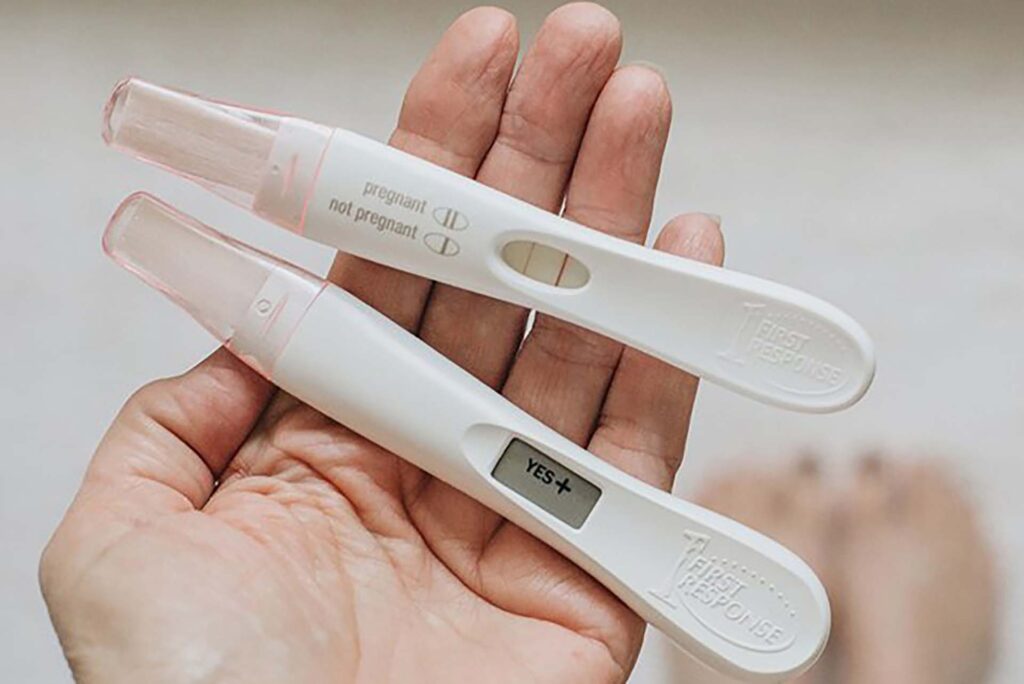Do you think you are pregnant?
- Article reading time: 5 minutes
Discovering you might be pregnant can be both exciting and anxiety-inducing. Whether you’ve been trying to conceive or have been taken by surprise, recognizing the early signs of pregnancy is crucial to ensure timely care and informed decision-making about your health. This comprehensive guide will quickly and easily familiarize you with the most common early pregnancy symptoms, what they mean, and how to get the care you need.

Understanding Early Pregnancy: What to Expect
Pregnancy begins at conception, but the first symptoms often appear even before your period is late. These subtle changes can vary greatly from person to person, making a definitive diagnosis of pregnancy difficult without a test. Early pregnancy symptoms are your body’s way of signaling that it is adapting to a new life growing within you. Common early signs include fatigue, nausea, and breast tenderness, but some women may also experience a heightened sense of smell or mood swings. Every experience is unique, and understanding your body’s signals can be both exciting and overwhelming.
Early detection of these symptoms can help you take better care of yourself and your fetus. It also allows you to quickly consult a doctor, which is particularly important if you have underlying conditions or experience unusual symptoms. For example, if you notice severe cramping or heavy bleeding, it is crucial to consult a specialist immediately, as these may be signs of a need for emergency care. Additionally, early awareness can enable you to adopt healthier habits, such as better nutrition and regular intake of prenatal vitamins, which are essential for fetal development.
Why Early Detection Matters?
Early detection of pregnancy allows you to start prenatal care sooner, which is vital for the health of both the mother and the baby. It also helps you avoid substances and activities that can be harmful during pregnancy, such as certain medications, tobacco, alcohol, or intense exercise. Furthermore, knowing about the pregnancy early enables you to plan your lifestyle and make necessary adjustments to support a healthy gestational period. This includes scheduling regular check-ups, discussing your medical history with a doctor, and considering genetic screening options if necessary.
Early detection can also have emotional benefits. Awareness of pregnancy can lead to feelings of joy and anticipation, but it can also bring anxiety and uncertainty. By accessing early prenatal care, you can gain access to resources and support systems that help you navigate these emotions. Engaging with a community of expectant parents or attending prenatal classes can provide valuable insights and reassurance, making the transition to parenthood a more informed and supported experience. Understanding the changes happening in your body can create a deeper connection to your pregnancy and help you prepare mentally and physically for the journey ahead.
Common Early Signs of Pregnancy
Although every pregnancy is unique, some symptoms are more common in the first few weeks. Here is a closer look at the early signs that may indicate you are pregnant.
1. Late/Missed Period
One of the most obvious and reliable early signs of pregnancy is the cessation of menstruation. If your menstrual cycle is regular and your period suddenly stops, this is a strong indicator that pregnancy has occurred. However, stress, hormonal imbalances, and other factors can also cause a missed period, so confirmation with a pregnancy test is important. Additionally, some women may experience light bleeding or spotting, which can be mistaken for a period, complicating early pregnancy detection.
2. Nausea and Morning Sickness
Many women experience nausea in the early weeks of pregnancy, often known as morning sickness. Despite its name, the nausea can occur at any time of the day or night. This symptom usually starts around the fourth to sixth week of pregnancy and can range from mild queasiness to severe vomiting. Morning sickness is believed to be caused by hormonal changes, particularly increased levels of human chorionic gonadotropin (hCG) and estrogen. Although unpleasant, it is generally a sign that your body is adapting to the pregnancy. Some women find relief through small, frequent meals or ginger tea, which can help calm the stomach.
3. Breast Changes
Early pregnancy often brings about noticeable changes in your breasts. They may become tender, swollen, or painful due to increased blood flow and hormonal changes. You may also notice that your nipples become darker and more sensitive, and the veins on your breasts become more visible. These changes are not only physical but can also serve as an emotional reminder of the new life forming within you. Many women find that wearing a well-fitting, supportive bra can provide comfort during this time of change.
4. Fatigu
Feeling unusually tired is a common early sign of pregnancy. The body is working hard to support the growing fetus, which can leave you feeling exhausted even after a full night’s sleep. Increased progesterone levels contribute to this fatigue, making rest essential in early pregnancy. It is not uncommon for women to experience a sudden need for naps or to feel excessively lethargic. Prioritizing rest and listening to your body’s signals can be beneficial in navigating this new stage of life.
5. Frequent Urination
In the early stages, you might notice that you need to urinate more often. This happens because pregnancy increases the blood flow to your kidneys, which helps your body to eliminate waste more effectively. Additionally, the growing uterus puts pressure on your bladder, contributing to this symptom. As the pregnancy progresses, this frequent urination may continue, especially in later stages as the baby grows and presses on the bladder. However, it is important to consume enough fluids and plan for bathroom breaks during outings.
6. Mood Swings
Hormonal fluctuations in early pregnancy can affect your mood, leading to feelings of irritability, anxiety, or emotional sensitivity. These mood swings are normal, but managing them can be challenging. Support from loved ones and self-care practices can help mitigate the emotional highs and lows. Engaging in calming activities like yoga, meditation, or even journaling can provide an outlet for these feelings, helping you process the whirlwind of emotions that often accompanies pregnancy.
7. Food Cravings and Aversions
Many pregnant women notice changes in their appetite, including an increased desire for certain foods or an aversion to others. These changes are linked to hormonal shifts and can vary greatly. While cravings are often harmless, maintaining a balanced diet is crucial to support the baby’s growth. Some women find themselves craving foods they previously disliked, while others might develop a strong aversion to their favorite foods. Keeping a food diary can help track these changes and ensure you are getting the nutrients you need.
8. Light Spotting or Mild Cramping
Some women experience light spotting or mild contractions early in pregnancy, often known as implantation bleeding. This occurs when the fertilized egg attaches to the wall of the uterus. Although generally harmless, any heavy bleeding or severe pain should be evaluated by a healthcare professional. It is important to distinguish between normal early pregnancy signs and those that might indicate a complication. Understanding your body’s signals can empower you to seek help when necessary, ensuring the health of both you and your developing baby.
Confirming Pregnancy: Tests and Next Steps
If you observe several of these symptoms and suspect you are pregnant, the next step is to confirm it with a pregnancy test. Home pregnancy tests are widely available, easy to use, and can provide accurate results from the very first day of your missed period.
When to Take a Pregnancy Test
For the best results, perform the home pregnancy test in the morning when your urine is more concentrated. If the test result is negative but you still suspect pregnancy, wait a few days and test again. Blood tests done by laboratories can detect pregnancy earlier and with greater accuracy.
What should be done after a positive test?
After pregnancy is confirmed, it’s important to see an obstetrician/gynecologist to begin prenatal care. This includes monitoring your health, discussing lifestyle changes, and planning for a healthy pregnancy.
For those seeking convenient, accessible care, the AI-based platform Dr. Jibi / AI Teb offers quick, personalized medical advice and can help you understand symptoms and next steps without leaving home.
When should we see a doctor?
Although many early pregnancy symptoms are normal, certain signs require immediate medical attention. If you experience heavy bleeding, severe abdominal pain, dizziness, or loss of consciousness, contact your doctor immediately. These may indicate complications such as ectopic pregnancy or miscarriage.
Dr. Jibi can be an excellent first point of contact for urgent questions or concerns. The AI doctor quickly integrates the latest medical research to provide accurate, evidence-based guidance and helps you decide whether in-person care is necessary.
Supporting your health in early pregnancy
Caring for your body in early pregnancy lays the foundation for a healthy journey ahead. Here are some essential tips to support your health:
Nutrition: Maintain a balanced diet rich in fruits, vegetables, whole grains, and lean proteins. Prenatal vitamins, especially folic acid, are crucial for fetal development.
Hydration: Drink plenty of water to stay hydrated and support increased blood volume.
Rest: Prioritize sleep and pay attention to your body’s need for extra rest.
Avoid harmful substances: Refrain from alcohol, tobacco, and unapproved medications.
Stress management: Practice relaxing techniques such as deep breathing, meditation, or gentle exercise.
Why choose AI-based telehealth services for early pregnancy care?
In today’s fast-paced world, accessing reliable healthcare can sometimes be a challenge. This is where AI-based telehealth services like Dr. gibi shine. They combine advanced artificial intelligence with specialized medical knowledge to provide personalized and timely care from the comfort of your home.
When it comes to early pregnancy symptoms or any health concerns, having an AI specialist doctor who remembers your history and offers comprehensive advice can make a significant difference.
Smart Support for Early Pregnancy Symptoms
Early pregnancy symptom recognition is the first step toward embracing the incredible journey of motherhood. Although symptoms can be subtle and sometimes confusing, paying attention to your body and seeking timely care is essential. Whether you’re confirming a pregnancy or managing early symptoms, Dr. gibi provides a convenient and reliable way to get the support you need.
Remember that every pregnancy is unique; if you feel uncertain about your symptoms or health, don’t hesitate to see a healthcare professional.
Article Categories
Children's health
Diseases and problems
Healthy nutrition and wellness
Women's health
Men's health
Treatment and prevention
Cancer
Mental health
Your general practitioner will now see you.
Instant health responses are provided by the general practitioner, because your health matters now.
